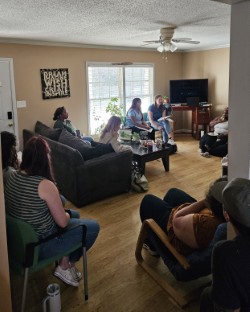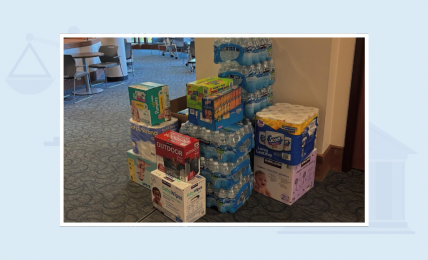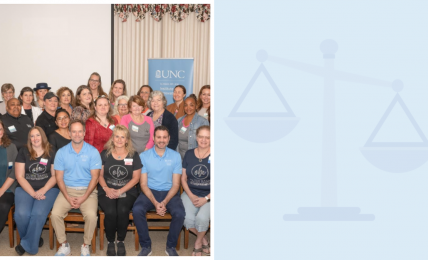Inside homeless shelters and courtrooms, on military bases and farms, UNC School of Law students are turning legal education into real-world change. Through three distinctive clinics, they’re tackling some of society’s most pressing challenges — from veterans’ rights to criminal justice reform and campus safety.
Military and Veterans Law Clinic: Fighting for Veterans’ Rights and Dignity
Behind every military discharge paper lies a story. For thousands of veterans, that story includes unfair discharges that cut them off from life-changing benefits, including health care, education and even the right to be buried in a veterans’ cemetery. The Military and Veterans Law Clinic works to right these wrongs, one case at a time.
The stakes are high. A less-than-honorable discharge can relegate veterans to years of struggle, blocking access to Veterans Affairs health care and forcing them into limited job opportunities. “The majority of people with other-than-honorable discharges never committed a serious offense,” explains Carolina Law professor John Brooker, who leads the clinic.
Last year, clinic students were integral to VA outreach efforts across North Carolina. In September 2024, they participated in a homeless veterans outreach event in Winston-Salem, joining an informal but critical network designed to connect veterans with essential services. The clinic also partners with Wake Forest University and North Carolina Central University law schools, taking students to observe courts-martial, tour VA facilities and learn the intricacies of veterans’ law firsthand.
“What I think we try to do is create a resonance machine,” Brooker says. “We’re sending all these students off to go do things on behalf of North Carolina.” That vision is growing. Law firms are now exploring partnerships with the clinic to expand their capacity for veterans’ cases across the state.
Cases often take five to seven years to resolve, demanding patience and persistence. But the results transform lives, with veterans regaining access to mental health care, securing housing and even purchasing homes with their restored benefits.
Reshaping Criminal Justice Through Survivors’ Voices

The statistics tell one story: women’s incarceration rates are rising even as overall imprisonment declines. But in Carolina Law’s newest clinical program, students are uncovering that the human stories behind these numbers are full of trauma, survival and systemic failure.
The Criminalized Survivor, Detention, and Justice Clinic digs deep into the intersection of domestic violence and criminal justice. The clinic is led by Deborah M. Weissman, the Reef C. Ivey II Distinguished Professor of Law. During a transformative visit to Benevolence Farm, a transitional living program for formerly incarcerated women, students witnessed firsthand how trauma and systemic barriers shape women’s paths through the legal system.
The clinic’s approach is comprehensive: students work on post-conviction relief cases, draft legislative reforms and challenge conventional reentry services that overlook women’s specific needs. Their research has revealed critical gaps in the system, particularly around traumatic brain injury, which is a common but overlooked consequence of domestic violence that can affect everything from behavior to rehabilitation.
Through the clinic’s work, second-year law student Erin Namovicz is learning that effective advocacy requires a deeper understanding of each survivor’s unique circumstances. “You need to slow down, ask survivors what they need and craft individualized strategies,” she reflects. “The message and recommendations must come from them.”
This survivor-centered approach extends to legal scholarship itself. In a groundbreaking move, a Benevolence Farm resident is co-authoring an article for the North Carolina Law Review with Weissman and a sociologist from Syracuse University. Students are also preparing to use international human rights tools to present cases before the Inter-American Commission on Human Rights Oversight Committee at the United Nations.
Building Safety Through Innovation: The Birth of She’s Not Here
When news of ride-share assaults sent ripples of concern through Carolina’s campus, three undergraduates refused to accept fear as the status quo. Their solution — an all-women transportation service — began as an Instagram post. Today, thanks to the Community Development Law Clinic within the Institute for Innovation, it’s poised to transform campus safety.
Under James Dickson Phillips, Jr. Distinguished Professor of Law and Director of the Community Development Law Clinic Tom Kelley‘s guidance, third-year clinic students William Henderson and Aprie’la Warren tackled the complex challenge of turning a grassroots safety initiative into a sustainable nonprofit. Their work went far beyond paperwork. Through biweekly consultations, they helped shape everything from governance structure to operational strategy, navigating bureaucratic hurdles that could have derailed the project.

“Getting to work with clients who have this great idea and then playing a part in making it come to life — that’s exactly why I wanted to do a clinic,” Henderson says. The impact is already visible. The organization, She’s Not Here, has forged partnerships with local businesses, built a network of student drivers, and created a model that could spread to other campuses.
As the organization prepares for its spring launch, it represents what the clinic does best: merging legal expertise with social impact. “We wanted to make this a real thing that Carolina could use for years to come,” says compliance director Sage Crosby. Through the clinic’s guidance, that vision extends far beyond a single semester and is creating lasting change for campus safety.



